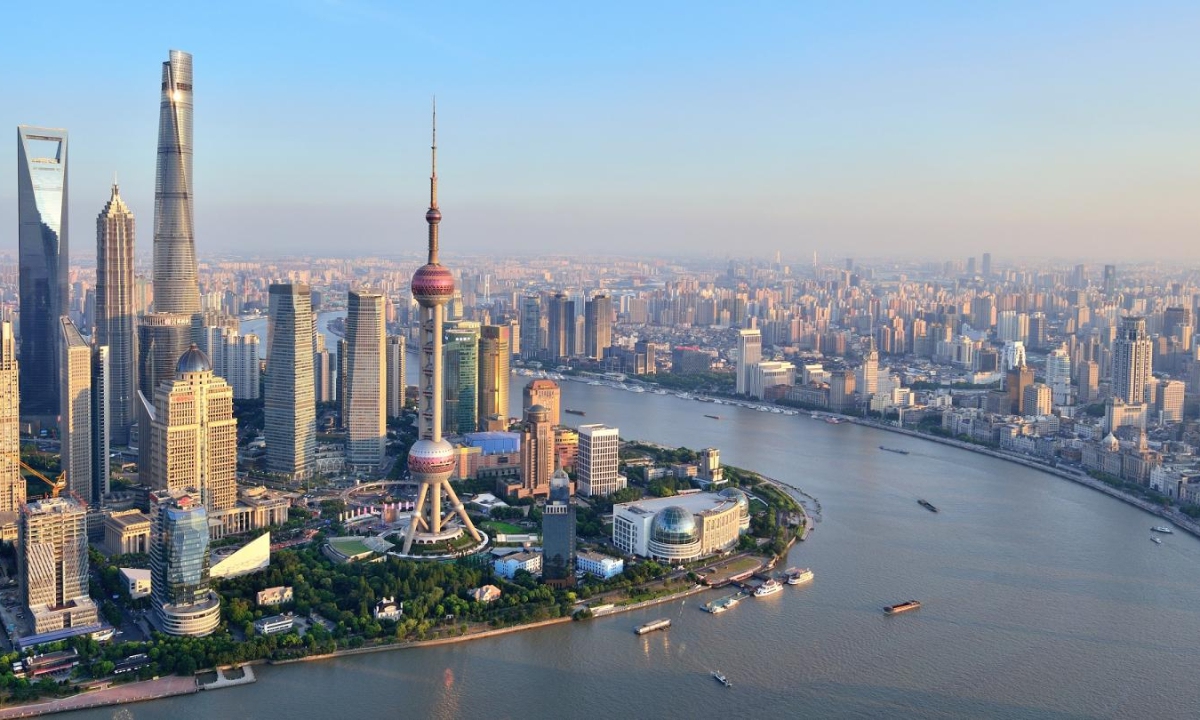
Lujiazui area in Shanghai Photo:Xinhua
China's top political advisory body on Tuesday opened the seventh session of its standing committee in Beijing, which focuses on consultations and discussions on building a high-level socialist market economy.
The session of the Standing Committee of the Chinese People's Political Consultative Conference (CPPCC) National Committee offered a clear signal of China's efforts to build a high-level socialist market economy through comprehensively deepening reform, which is the topic for an all-important meeting scheduled for July, experts said.
Such efforts will further strengthen China's institutional advantage in economic governance and are set to underpin China's continuous and high-quality economic development for years to come, the experts noted.
On Tuesday, Wang Huning, a member of the Standing Committee of the Political Bureau of the Communist Party of China Central Committee and chairman of the CPPCC National Committee, called for in-depth consultations and proactive suggestions for building a high-level socialist market economic system.
Chinese Vice Premier Ding Xuexiang said on Tuesday that China will support state-owned businesses to become stronger, better and bigger, while also creating a favorable environment and providing more opportunities for the development of the non-public sector.
China will accelerate the construction of a unified national market and improve basic market economy systems such as property rights protection, market access, fair competition and social credit, Ding said.
China will also strengthen coordination between fiscal policy and monetary policy to promote sustained and sound economic development, as well as steadily expanding institutional opening and cultivating new advantages in international economic cooperation and competition, Ding said.
At the opening meeting, members of the Standing Committee of the 14th CPPCC National Committee heard reports on topics such as accelerating the transformation and upgrading of the manufacturing industry, promoting the green and low-carbon transition of industries, and the Guangdong-Hong Kong-Macao Greater Bay Area's participation in the Belt and Road Initiative.
Experts said that the session offers a clear signal that China will steadily promote the construction of a socialist market economy through deepening reform.
"There are many key words in the content of the meeting, which provide a clear window into the main logic of China's continuous efforts to comprehensively deepen reform," Cong Yi, a professor at the Tianjin School of Administration, told the Global Times on Tuesday.
Further comprehensively deepening reform and advancing Chinese modernization are key topics for the third plenary session of the 20th Communist Party of China (CPC) Central Committee, which is scheduled to take place in July. The whole Party must put reform in a more prominent position and deepen reform in all respects with a focus on promoting Chinese modernization, said a CPC Central Committee Political Bureau meeting on April 30, when the time for the third plenary session was announced.
"The third plenary session is of great significance for economic development at the current stage and for a period of time in the future," Cong said, noting that the meeting could draw the basic framework for reform and opening-up in the next five years and beyond. "It will focus on major issues and set a clear direction for economic development."
As China continues to improve its economic governance system, it will also continue to see sustained, high-quality development and play a greater role in promoting global economic development, according to some overseas experts.
"China's fundamentals remain solid: huge financial resources in the hands of the state, a vast domestic market, a progressively skilled labor force, unrivaled industrial capacity globally and accelerated advances in cutting-edge technologies. When considering these factors, China stands poised for continued success," Marco Fernandes, a Brazilian political commentator and scholar, told the Global Times in an interview.
Fernandes said that despite rising global challenges, China, which contributed approximately 30 percent of global growth in recent decades, will maintain its role as the primary global growth driver in the coming years.
In the first quarter of 2024, China's GDP expanded by an impressive 5.3 percent, which beat market forecasts and led to growing confidence in China's growth prospects. The IMF last week projected that China's GDP growth in 2024 will reach 5 percent, an upward revision of 0.4 percentage points.




